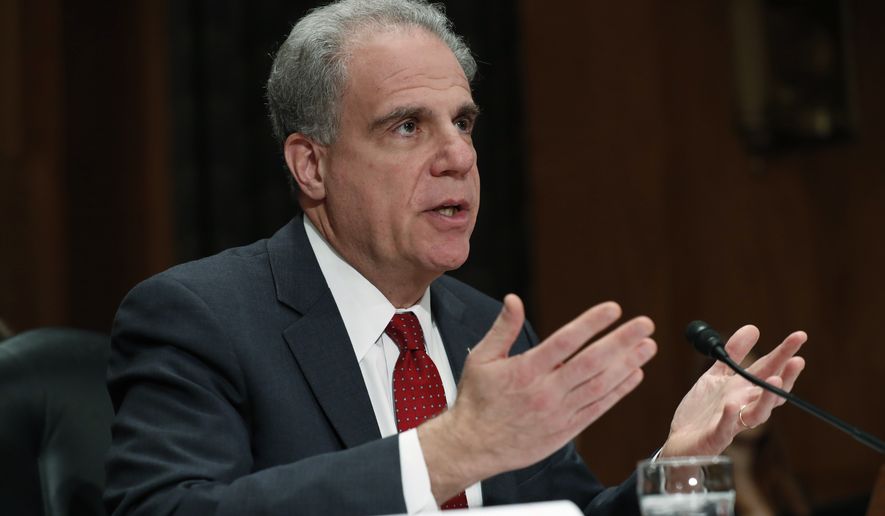The FBI’s top brass has not been cleared of wrongdoing for the slew of errors in the agency’s Trump-Russia collusion probe and serious questions remain, Justice Department Inspector General Michael E. Horowitz said Wednesday.
Testifying before a Senate panel, Mr. Horowitz rebutted claims his report released last week exonerates the FBI.
He pointedly cautioned that his investigation of FBI abuses in obtaining a wiretap warrant for Trump campaign aide Carter Page did not reach any conclusions about the agents’ motives. The findings, he said, do not determine whether animosity toward Mr. Trump was a factor in the FBI’s stunningly sloppy application to the secret Foreign Intelligence Surveillance Act court.
Mr. Horowitz said he could not conclude that bias was a factor, but he also could not offer explanations for the FBI’s actions, which included errors, mistakes and omitted critical information.
“There are so many errors, we couldn’t reach a conclusion or make a determination on what motivated those failures other than what we did not credit, what I lay out here, the explanations we got,” he told the Senate Homeland Security Committee.
Mr. Horowitz said the FBI’s intent remains a lingering question for him, despite reviewing more than 1 million documents and interviewing more than 100 witnesses in his 18-month investigation.
“How did all these failures in the FISA process — that is layered with all these controls — happen and why?” he asked. “At this stage, we didn’t get good explanations on that and that is something we would have liked to have had good explanations about.”
A day earlier, the FISA court lambasted the FBI in a rare public order based on Mr. Horowitz’s conclusions.
Judge Rosemary M. Collyer, the court’s chief judge, said the bureau’s actions were “antithetical to the heightened duty of candor.”
Committee Chairman Ron Johnson said at the hearing the court’s order is a “dramatic rebuke” of the FBI, adding that he is questioning whether other FISA applications were also riddled with errors.
“I think the FISA court is in jeopardy, personally,” the Wisconsin Republican said.
Mr. Horowitz last week released his extensive report on the early stages of the Russia probe that the FBI dubbed Operation Crossfire Hurricane.
His team found at least 17 mistakes in the FISA application to wiretap Mr. Page. FBI missteps included submitting a doctored email as evidence and failing to include information that undercut allegations Mr. Page was working with Russia.
Mr. Page was never charged with any wrongdoing.
The inspector general also concluded bias was not a factor in the investigation’s initial stages, saying the FBI was right to raise flags about Mr. Page.
Democrats have seized on that finding, saying it proved Mr. Trump’s claims of a politically motivated coup were unfounded.
Sen. Gary Peters of Michigan, the top Democrat on the committee, glossed over the FBI’s bungling of its FISA application to surveil Mr. Page. Instead, he focused on Mr. Horowitz’s conclusion the FBI probe was justified.
“The most important fact that we should take away from this report and this hearing is that Russia, a foreign adversary, engaged in a sweeping and systemic effort to interfere in the 2016 election and that the FBI was right in investigating those who may have been involved,” he said.
Republicans on the committee repeatedly pressed Mr. Horowitz on whether his failure to find bias didn’t rule out bias an explanation for the FBI’s errors.
“Just because you didn’t find it doesn’t mean it didn’t exist,” said Sen. Rand Paul, Kentucky Republican.
Sen. Josh Hawley wondered how the FBI could keep making the same mistakes in the subsequent renewals of the Page FISA warrant.
“Were they all just stupid?” the Missouri Republican asked while ticking off the complex process to obtain a FISA warrant.
Mr. Horowitz said the FBI’s mistakes went beyond fouling up the Page warrant. He said agents should have reassessed whether to continue surveilling Mr. Page after learning the allegations against him were not credible.
FBI officials should have ended monitoring Mr. Page in January 2017, when no evidence of wrongdoing turned up after months of surveillance, Mr. Horowitz told lawmakers. Instead, the bureau continued to watch Mr. Page until September 2017.
“If you are getting information that isn’t advancing, and in fact, potentially undercutting, or simply undercutting your primary theme or theory as was happening here … you’d look at the Carter Page file and say, should I keep going on this,” he said.
Mr. Horowitz said even as agents pushed the Page investigation forward, others questioned why they had not reevaluated a probe that wasn’t fruitful.
“We’ve got agents talking to one another about why Page is even a subject anymore,” he said.
Mr. Johnson said the investigation should have been shut down sooner. He said Mr. Trump was “tormented for over two years … all based on a false narrative.”
• Jeff Mordock can be reached at jmordock@washingtontimes.com.




Please read our comment policy before commenting.